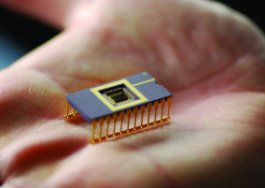Nuclear Powered Batteries Are Coming

Manufacturers are constantly improving the battery life on all manner of mobile gadgets, but the typical chemical battery may have been pushed to its limit. Widetronix is looking to change the game with its miniscule betavoltaic batteries, which glean energy from radioactive sources (such as tritium), continuously charging themselves for more than 25 years. These nuclear power cells rely on the natural decay of electrons given off by radioactive sources—as opposed to fission power and the splitting of atoms—and such semiconductors as silicon carbide to give the battery juice.
While betavoltaic batteries have been prohibitively expensive in the past due to their gross inefficiency, Widetronix has successfully tested the use of silicon carbide semiconductors, which can affordably operate for years without suffering from the radioactive damage that degrades traditional semiconductors. Prototypes currently provide mere nanowatts of power, but the company is experimenting with stacking chips together for more net energy.
Potential applications include low-power implantable devices that help keep track of a patient’s health. As the technology evolves, small sensors that could monitor the conditions of bridges, roads, and buildings may become a reality. Promising as this technology may be, don’t expect to see netbooks that can run unplugged for years any time soon. According to Jon Greene, the company’s CEO, betavoltaic-powered devices won’t hit the market until 2011.
Stay in the know with Laptop Mag
Get our in-depth reviews, helpful tips, great deals, and the biggest news stories delivered to your inbox.
